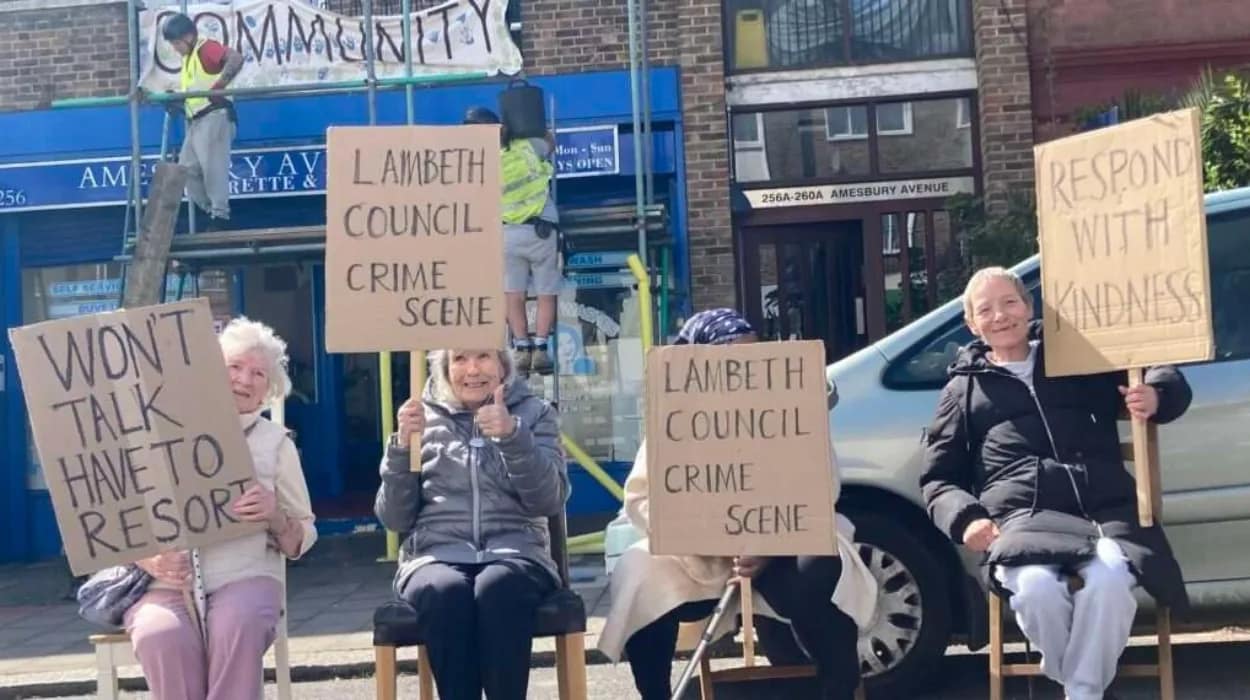Lambeth (Parliament Politics Magazine) – Lambeth residents block street access to protest a £650,000 council plan to replace parking spaces with seating, halting workers from starting the project.
Businesses and residents on Streatham’s Amesbury Avenue are worried that the proposed modifications will destroy neighborhood stores and turn the area into a haven for criminal activity.
To prevent Lambeth Council staff from entering and beginning work on the contentious street project, residents blocked up the road on Monday, April 21, using fictitious crime scene tape. Residents had prevented council workers from Amesbury Avenue for the second time in a month.
Berhe Tsegay, who owns a street-side laundromat, claimed that cutting back on customer parking on Amesbury Avenue would “destroy” his company.
He told the Local Democracy Reporting Service (LDRS) on Tuesday (April 22):
“If this project goes ahead, my business will be completely destroyed. We have customers from the local community. How are they going to carry their items if there’s no parking for vehicles?”
The 59-year-old said plans to replace some parking spots with planters and seating, known as ‘parklets’, were unnecessary.
He added:
“There’s a park two streets away from here. We don’t need a parklet. It will attract alcoholics. If the council wants to help, they could do lots to improve the outside lights and to do maintenance to council flats [on the street].”
Tony McDermott, a resident of the street for 40 years, claimed locals had tried to raise concerns with the council about the plans but had been met with a wall of silence.
He said:
“This is going to cost £650,000. It’s a lot of money to spend especially when Lambeth Council are supposed to be skint. We’ve been asking them from day one to communicate with us and they have turned their back on us.”
The council’s comprehensive housing plans have been hailed by numerous elected officials and community organizations as an essential and audacious move in addressing the city’s homelessness and housing affordability issues.
In order to stabilize housing for vulnerable groups, they commend the emphasis on affordable homeownership, tenant protections, infrastructure investments, and wraparound support services.
The multidimensional strategy is valued by community organizations and housing coalitions, which highlight the significance of rental assistance, eviction prevention, and financing for the construction of affordable homes.
The 62-year-old expressed his belief that the planned parklet will draw drunks and leave patrons of nearby businesses without a place to park.
The suggested plan will transform the “neglected shopping parade” into a “better place to spend time and do business,” Lambeth Council informed the LDRS. The council also stated that it has been consulting the locals on Amesbury Avenue modifications for five years.
To guarantee that the plans satisfy the requirements of families and individuals dealing with housing instability, they promote ongoing cooperation among stakeholders.
However, Petra Kjell Wright, a local, claimed that the Labour-run council’s assertions that it had developed plans based on the needs and desires of the community didn’t add up.
She said that it has been sold as a scheme that will work for local businesses, but what the local businesses are saying is [that] with Lambeth’s proposal they will lose trade. It’s going to make it more difficult for them. They don’t think they are going to survive.
It will make it more difficult for them to accept the deliveries. There will be less parking for the customers.
Ms Kjell Wright added:
“We have tried to come up with a solution that would work better for the area. It would tick lots of Lambeth boxes as well. We want to work with the Lambeth council. But if this is not settled in an amicable way, we will be out on the streets again.”
A council spokesperson added:
“Local people are rightly passionate about their neighbourhoods and we have held many discussions about this improvement project. Our proposals both align with our strategic priorities and local people’s feedback.”
He added that there has been a huge amount of work completed to engage the community in the design [of] the scheme and they are confident that a positive outcome that delivers for the local area will be the end result.
What are the residents’ main concerns about the seating replacement in Lambeth?
Residents are concerned that seating needs to be planned to allow for safe, independent entry and exit. Particularly for elderly or less mobile people, poorly constructed chairs—such as those that are too deep, too low, or lack armrests—can be uncomfortable, make it difficult to rise up, and even raise the risk of falls.
Anger, a loss of independence, and health problems like exhaustion or pressure sores can result from seating that is uncomfortable or does not promote proper posture. The necessity of chairs that meet their physical requirements, such as the proper height and support, is emphasized by the residents.
Residents are worried about losing parking spots they depend on, which impacts their daily routines and convenience, in addition to seating design. This pragmatic effect frequently feeds opposition to parking being replaced with green areas or benches.


